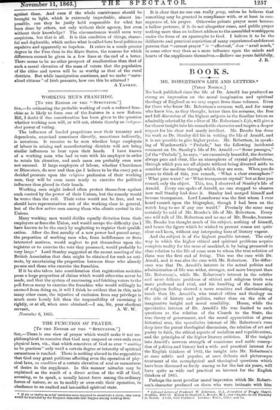THE FUNCTION OF PRAYER.
[To THE EDITOR OF THE " SPECTATOR."]
SIR,—There is one view of prayer which would make it not un- philosophical to conceive that God may suspend or over-rule even physical laws, viz., that which conceives of God as ever " waiting to be gracious" only until a certain degree or intensity of spiritual earnestness is reached. There is nothing absurd in the supposition that God may grant petitions affecting even the operation of phy- sical laws, on condition of a certain elevation of soul or earnestness of desire in the supplicant. In this manner miracles may be explained as the result of a direct action of the will of God, arousing, so to speak, a usually latent force among the ordinary forces of nature, so as to modify or over-rule their operation, in obedience to an exalted and intensified spiritual state.
• If six or twelve months' residence were required to constitute a claim, very many world be excluded by the frequent removals that happen among working Men.
It is clear that no one can really pray, unless he believes that something may be granted in compliance with, or at least in con- sequence of, his prayer. Otherwise private prayer must become a hollow pretence, if it do not altogether cease, and public prayer nothing more than an indirect address to the assembled worshippers under the form of an apostrophe to God. I believe it to be the deliberate and practical conviction of many experienced anddevout persons that " earnest prayer " is " effectual," does " avail much," in some other way than as a mere influence upon the minds and hearts of the supplicants themselves.—Believe me yours faithfully, J. R.






























 Previous page
Previous page